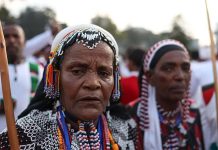Africa-Press – Botswana. MAUN: The foremost front part of the floodwaters coming through a dried river is called ‘Leleme’ (tongue) in Ngamiland. And it has great spiritual and medicinal powers according to the locals here.
Last week dozens of residents along the Boro River, from the Buffalo Fence to Maun, defied coronavirus (COVID-19) lockdown regulations to rush to the river to meet Leleme as the water travelled down to the Thamalakane River.
Many came with bottles to fetch water from Leleme. Some wash their faces, dip their feet into water, and spray the dirty water all over their body while making wishes.
“Ke bata nyalo”, “Ke bata banna ba nnete”, “Business ya me e gole”, “Ke kopa pholo”, “Ke kopa khumo”, “Bana ba me ba pase”, “Ba ntuele P5,000”,
are some of the bold wishes and aspirations that were overheard by the river from the elated people following Leleme.
“It’s like meeting the saviour in liquid form,” summed one old woman carrying 10 litres of the water. They fetch the dirtiest part where the water is still sweeping the dry riverbed. That is where the river blessings are, they say.
The water is also used by traditional doctors and some pastors from African churches. The Monitor crew met two traditional doctors and a pastor brandishing a ZCC badge and wooden stick, busy fetching Leleme waters with big containers.
Phineas Setlhare, a traditional doctor in Boro II said he mixed the water with some roots and herbs to make various medicines for his clients. “Leleme is powerful and very effective when I mix it with some other medicines. It is also used to cleanse, remove bad luck, we use it as Setswana traditional doctors and some churches use it too. It has great medicinal power,” Setlhare said.
Setlhare said he will be fetching at least 40 litres for his stockpile to use for consultations.
Another traditional doctor, who wanted to remain anonymous, said he was from Zambia and he knows for sure that the water works for his clients.
“I can’t travel all the way from Zambia for something that does not work. I know this for sure,” he attested.
Another woman from Matlapana ward in Maun at the junction of Boro and Thamalakane Rivers was seen coaching her daughters on how
to fetch Leleme to be very effective. She said her grandparents taught her the value of Leleme and she is keeping the tradition by teaching her own children.
“It is not every year that Leleme comes here so when it comes we know that it is the beginning of the good times. Even this corona thing will go after this,” she happily said.
On Saturday, at 1:31am, the first waters of the 2020 Okavango flood finally reached Thamalakane River in Maun. By dawn most people had already gathered by the river to fetch water from Leleme. They washed their faces, danced on the water, shouted in jubilation, performed rituals and fetched water. Suddenly everyone had forgotten about the coronavirus and its restrictive social distancing prescriptions.
One old woman jumped into the fresh water, with full clothes on in a symbolic reflection of what the water arriving in Maun really meant to the people of the river.
As more people gathered to celebrate the flood arrival the security forces intensified their operations at the river. More police and soldiers came to the river to chase away the people.
Interestingly, most of the same police officers and soldiers who were chasing away the people from the river, also took time to wash their faces with Leleme – performed the same rituals like the civilians.
By Saturday afternoon (12 hours since the water arrived in Maun), the police reported to have charged seven people who went to the river without permits.
Since the Boro River split into two at the Thamalakane River junction and there, creating two Maleme, residents circumvented police patrols to access their spiritual Leleme from either end.
By Sunday, the police resorted to extreme measures of guarding Leleme throughout the day.
Two police officers were stationed at the Leleme to make sure that people do not come and access it or fetch water without permits. This infuriated many locals who saw the move as a selfish and inhuman move that denied them to meet their liquid saviour that comes once in a long time.






